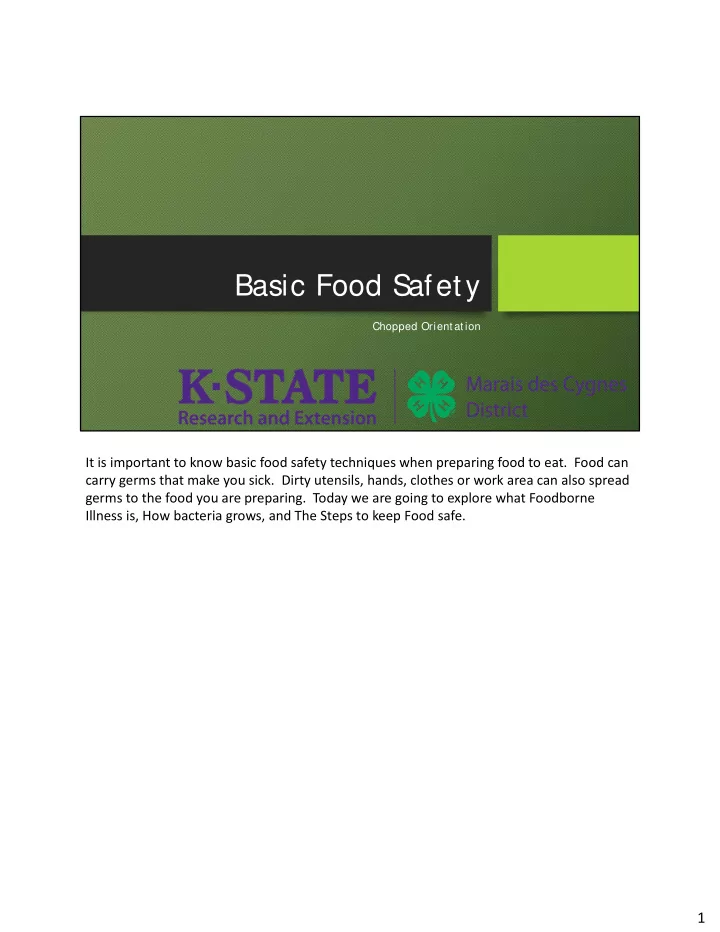

Basic Food S afety Chopped Orientation It is important to know basic food safety techniques when preparing food to eat. Food can carry germs that make you sick. Dirty utensils, hands, clothes or work area can also spread germs to the food you are preparing. Today we are going to explore what Foodborne Illness is, How bacteria grows, and The Steps to keep Food safe. 1
What is Foodborne Illness? • Any Illness that humans get from food caused by bacteria, viruses, parasites, or toxins. • Most likely to get a foodborne illness by: • Not keeping food hot or cold enough • Poor personal hygiene • Not cooking or reheating food to proper temperature • Cross-contamination of raw and cooked foods • Not cleaning equipment well. 2
Bacteria Growth Number of Divisions Time Elapsed in Minutes Number of Cells 0 0 1 1 20 2 2 40 4 3 60 8 4 80 16 5 100 32 6 120 64 7 140 128 8 160 256 Under the best conditions, bacteria can divide every 20 minutes. In the chart on the screen, we can see the growth of a single E. coli bacterium cell over several hours. How many E. Coli cells can be produced in an hour by just one starting cell? 8 How many after 2 hours? 64 If it takes 128 cells of E. Coli to make you sick, how long would it take for one cell to grow enough to make you sick? 140 minutes 3
Before Y ou Begin to Cook • Wash hands for at least 20 seconds • Clean Fingernails • Clean Work Area • Wear Clean Clothes • Wear Apron • Put up Long Hair • Use Clean Cloth or Paper Towel to wipe hands • Use Paper Towel or Mop to clean spills on floor • Use clean utensils Now lets talk about some simple rules you can follow to keep your food safe. These rules should become habit. (Things you do without thinking because you know the rules well.) Before you begin to cook follow these rules: • Wash your hands with soap and warm water for at least 20 seconds. • Be sure your fingernails are clean and free of dirt. Check to see that your work area is clean. • • Wear Clean Clothes • Wear and apron or tie a clean kitchen towel around you to keep from spreading any germs to the food and to keep your clothes clean. • Clip long hair back so that it will not fall into the food. • Use a clean cloth or paper towel to wipe your hands. This prevents spreading germs. Do not wipe hands on your clothes or apron. • Use a paper towel or mop to wipe up spills on the floor. Don’t use the dish cloth or towel. The floor is covered with germs. • Use clean utensils. 4
While Y ou Are Cooking • Keep your hands away from hair, face & pets • Do Not Lick your Fingers • Do not taste food using your mixing spoon. • Keep dairy products, meat, poultry, and eggs cold. While you are cooking, follow these food safety guidelines: • Keep your hands away from your hair, your face or your pets. If you do touch any of these things, wash your hands before returning to cook. • Do not lick your fingers while cooking. • Do not use your mixing spoon for tasting foods. Use a separate spoon for tasting and never reuse the spoon once it has been in your mouth. • Keep dairy products, meat, poultry, and eggs cold. Don’t leave them out of the refrigerator while you are cooking or bacteria could grow. 5
Cleaning Food • Wash fruits and vegetables before use • Remove soil from carrots, celery, and potatoes • Wipe tops of cans, boxes, and bottles before opening. • Look for clues that food is spoiled: • Color • Odor • Appearance It is important to clean foods before you use them in cooking. • Wash all fresh fruits and vegetables in plenty of cool water before using them. • Use a vegetable brush to wash food such as carrots, celery and potatoes to remove any soil that remains. • Wipe the tops of all cans, boxes, and bottles before opening them. This helps remove any germs that are on them. • Look for clues that food is spoiled. Spoiled food can make you sick. Check the color: does it look right? Check the odor: does it smell the way it should? Check the appearance: do you notice anything unusual about the way it looks? If any of these clues make you think the food is spoiled, ask an experienced cook if the food is safe to use. Never taste food you think is spoiled. If in doubt, throw it out. 6
Cross-Contamination • Do Not Use the same utensils on raw meat and vegetables • Wash hands after handling raw meat. • Cook meat to the correct internal temperature. Avoid Cross ‐ Contamination when cooking. Cross ‐ Contamination is when bacteria or other microorganisms are transferred from one food or object to another, with harmful. This can cause the bacteria to transfer to the vegetables and grow. Here are some ways to keep Cross ‐ Contamination from happening: Do not use the same utensils on raw meat and vegetables. This includes knives, cutting • boards, spoons, etc. Make sure to wash any utensil that come in contact with raw meat products before using on any other food items including cooked meat. • Wash hands after handing any raw meat. • Cook meat to the correct internal temperature. 7
Finding Food S afety Mistakes • Read the story and highlight all the food safety mistakes. We will discuss the food safety mistakes as a group in 5 minutes. 8
Questions! 9
Recommend
More recommend